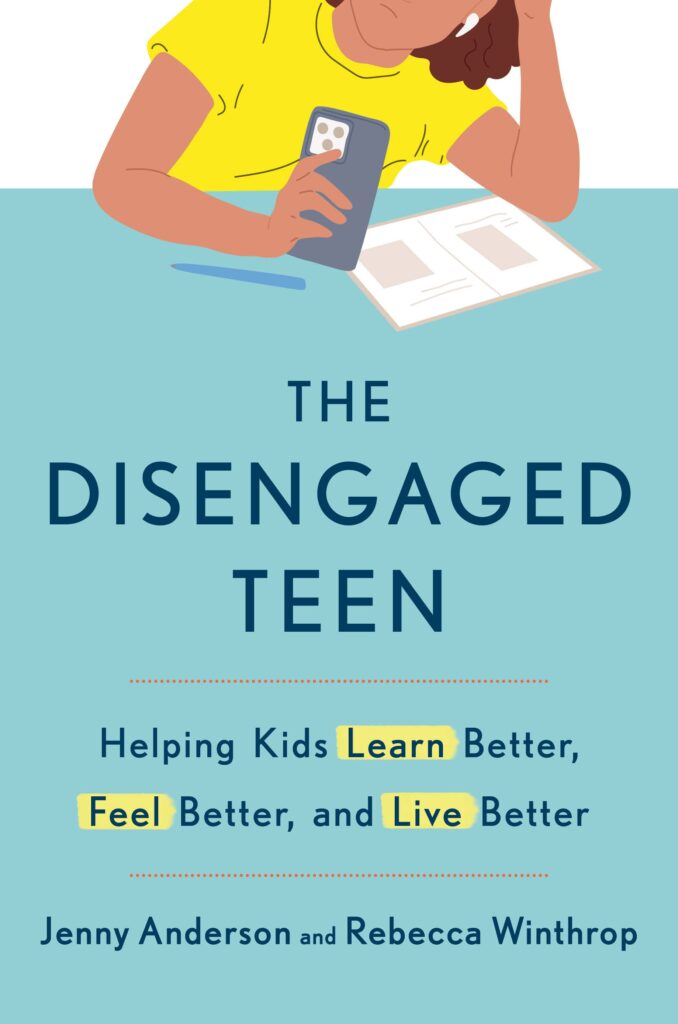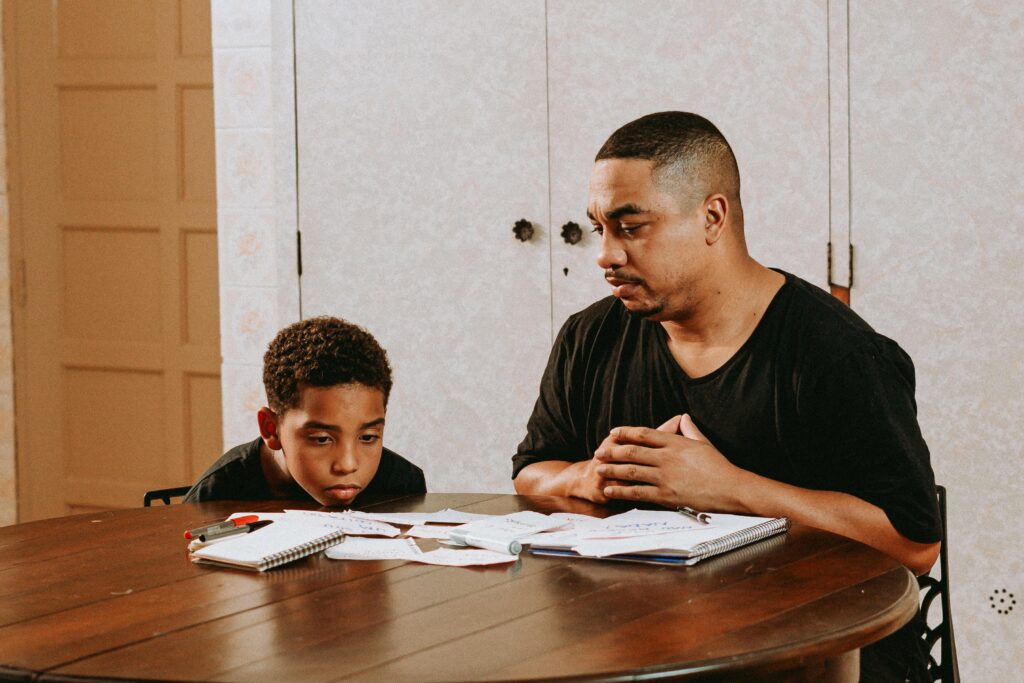The Disengaged Teen
Help your child turn boredom and burnout into a love of learning
January 27, 2025
by Himani Dixit, MD
At our January NYC-PIA Online Seminar Series, Laurie Freeman sat down with Jenny Anderson and Rebecca Winthrop, authors of The Disengaged Teen, to discuss how to motivate your child and give them the agency to be engaged with learning. How to give them the inner force and the spark to succeed at school and in life.
Parents send signals–knowingly and unknowingly–about how their children should approach learning. Here, Anderson and Winthrop talk about the ways you can ensure the signals you send help your child get excited about pursuing the things they are interested in. Including ensuring the parent-child relationship stays strong, teaching your child to think ahead, regulate, and make good choices, and being okay if something doesn’t go well.

Jenny Anderson

Rebecca Winthrop
Speakers
Jenny Anderson is an award-winning journalist, author and speaker. Her work has appeared in some of the world’s leading publications, including The New York Times, where she spent ten years on staff, The Wall Street Journal, TIME, The Atlantic and Quartz.
Rebecca Winthrop is a global authority on education. She is the director of the Center for Universal Education at Brookings Institution and an adjunct professor at Georgetown University. She is a highly sought-after advisor and speaker including by parent networks, school leaders, the White House, the United Nations and Fortune 500 companies.
Moderator
Dr. Laurie B. Freeman is a licensed psychologist, certified Emotionally Focused Couples Therapist/Supervisor (EFT), and a certified AEDP therapist. She has thirty years of experience in private practice helping individuals and couples in the New York City community with relationships, anxiety, parenting, and navigating life stages.
Laurie Freeman: Tell us a bit about how The Disengaged Teen came about.
Jenny Anderson: There’s a hole in the market around how to specifically engage teens in learning, and
I was interested in working with Rebecca to provide parents with resources and information on the topic.

Rebecca Winthrop: As a parent of two teens, I struggled to keep my teens engaged during the COVID years. That led me to do research and write the book.
LF: A lot of parents want to understand the difference between wanting a good grade and being deeply engaged in learning. Can you talk about that?
JA: Engagement is about the four dimensions: how we think, behave, feel, and initiate around our learning. Typically, we think of engagement as how kids show up–are they behaving or misbehaving, complying or not complying, etc. It’s actually much more than that. It’s how do they feel about what they are learning and how do they see themselves as learners.
In learning, so much of it is invisible. We wanted to make that learning visible.
RW: We did a comprehensive survey of 65,000 students, 3rd through 12th grade. We found that kids become more disengaged the older they get. They tend to fall into the following categories:
- Passenger mode: These kids tend to “coast” and do the bare minimum. That’s about 50% of high school kids.
- Achiever mode: These kids are trying to be the best at everything that is put in front of them, from classes to extracurricular activities. Many of them are unhappy and fragile and risk averse.
- Resistor mode: These kids are dubbed the “problem children.” They are maybe skipping classes, not doing homework, or being disruptive like the class clown.
- Explorer mode: This is where we want kids to spend the majority of their time. They are proactive and initiate learning. This is less than 4% of kids in middle and high school. These kids are more prepared for the world of generative AI.
LF: What can you tell us about kids who are excited about school and getting good grades, but then somehow tip into feeling stressed and like it is not meaningful anymore? Is there anything schools can do to get kids back into explorer mode? Is there anything parents can do to prevent this shift from happening?
JA: It’s about digging into this embedded mindset that they are defined by their achievements. Ask about things like sleep and general well-being before asking about grades. It’s important to tell your kids that they are more than their achievements and grades, and helping kids look inside themselves and asking what they care about and what are they interested in outside of their grades.
It’s important not to crowd out the identity development that is so crucial to this age. Highlighting relationships with others and taking small risks is also important.
LF: Do either of you personally ever struggle with having kids achieve the most they can? For example, taking the hardest classes versus letting them do something easier and more interesting or fun for them?
JA: I don’t believe that my daughter going to a particular college is going to make her happier. In fact, I think it could potentially make her unhappier. I would rather her be in Explorer Mode in high school and college.
LF: So maybe it’s about parents doing their own work and getting clear about what is important to emphasize. We have a lot of teens say that they feel like there is indirect pressure from their parents to achieve high grades, and they get indirect signals that achievement is very important. Maybe it’s about parents coming from an authentic place that it is really more about balance?
RW: It is very hard in the competitive schools that our kids are in to find the balance. We call it the Achiever Conundrum. I’ve come to the personal conclusion that it’s better to have a happy passenger than an unhappy achiever. My older son is in a very competitive school and in 7th grade, one of his dearest friends committed suicide. These personal anecdotes combined with the data we’ve collected shows us that where you go to college makes very little difference in kids’ life trajectories. Two, college admissions counselors are really looking for depth, not breadth.
LF: It’s interesting how kids pick up on all the subtle signals, even though no parent says “I want my child to go to this particular school.” It is very difficult to pay attention to mental health when kids are soaring along, and nothing bad has happened yet. How do we catch it early?
JA: It’s important to emphasize that kids should be doing their very best, but if they don’t get a perfect score, it’s okay, and it’s possible to make other plans, that kids have alternatives, and there are multiple pathways. Emphasize to them that there are always ways to pivot.
Tell kids about their “future possible selves” to help them imagine a future they would like, and then help them think of many paths to get to that future self. The parent has to be the pathway.
LF: That requires the parents to be able to put things into perspective, too. How can we convey the right sentiment to our kids?
RW: You can ask about the content of what they are learning rather than just praising the achievement. Don’t track performance daily, maybe just weekly. Help them attach meaning to what they are learning. For all of the kids, something called “transcendent thinking” is really important for creativity. It’s our human creativity to working with others and finding new solutions that is really going to separate those who are leading and able to thrive and those who aren’t.
It happens when kids have a little bit of down time, not when they are busy “doing.”
JA: For teenagers, life is like a dress rehearsal. They are practicing what kind of adults they want to be, and when you practice, it’s okay to mess up. Useful feedback on how to improve is more important than condemning a bad performance.
LF: What ideas do you have for a child who is in Resistor Mode? 
RW: The modes are fluid, and kids go in and out of these modes frequently, sometimes even daily. There are actually a lot of kids in really competitive schools that are in Passenger Mode. They are getting top grades, and the performance is there, but they aren’t deeply engaged.
The Resistor Mode kids are using their voice to show their unhappiness, and we have to see this as a cry for help.
LF: How can parents recognize when their child is in Resistor Mode?
RW: It usually starts when kids are a little bored and start looking for something interesting to do in class. They become class clowns, then disruptors, then maybe act out in bigger ways. Not following rules or not turning in homework. Withdrawal and low self- esteem are also warning signs of a deeper mental health issue.
JA: You’ve got to get to the “why,” meaning what is causing them to resist? You have to get into the trenches with them, side by side, but not as a face off or confrontation. Help your child think about their future self by thinking about someone they admire and that person’s qualities, and how your child might develop those qualities in themselves. What expectations, goals, and obstacles would there be in that pathway.
Many parents think big emotions are scary, and they will dismiss or tamp down on those emotions. It is important instead to coach them through the emotions from a place of deep love.
LF: Maybe kids are going through Resistor Mode because they have overwhelming feelings that they don’t know how to process other than resisting?
JA: Some kids go down a spiral when they don’t see a path out of feeling overwhelmed.
LF: When someone is in Passenger Mode, but they are doing really well, it’s still important to pay attention because they run the risk of tipping over into resistor mode when going through a hard time. Can you give us some advice for kids in Passenger Mode?
 RW: Two reasons that kids can get stuck in Passenger Mode. Firstly, they are outside of their zone of proximal development. There’s a sweet spot where kids learn well – it’s when they are challenged but they are supported in their learning. If it’s too easy and they are bored OR if the learning is too difficult, that can put them into Passenger Mode.
RW: Two reasons that kids can get stuck in Passenger Mode. Firstly, they are outside of their zone of proximal development. There’s a sweet spot where kids learn well – it’s when they are challenged but they are supported in their learning. If it’s too easy and they are bored OR if the learning is too difficult, that can put them into Passenger Mode.
Nagging from parents doesn’t work for kids who are procrastinating. It shuts down a part of kids’ brains. Help them to find a strategy to get work done, and give them support if they are procrastinating because the task is too difficult.
It’s also important to show them relevance or connection to what they are learning to life in the real world.
JA: The last point is helping kids lean into their spark or passion. A lot of good things like increase in attention span and working memory happen when kids are interested in their learning. Take interest in what they are interested in.
LF: For example, instead of being contemptuous of the fact that teenagers may be on social media scrolling, ask about who they are following or what they are viewing, as a way of connecting with them and understanding what they are interested in.
RW: You’ve picked up on a really big theme of the book which is that learning is relational and social. Parents’ most effective role is being a model and co-learner with their child. Discussion is how adolescents grow and develop. You can set boundaries and rules but never break the relationship.
LF: We have a question around how this applies differently to boys vs girls?
RW: There is some evidence that boys and girls show up differently given gender norms. Boys get less social status through achievement, whereas girls worry more about letting others down if they don’t achieve. We found that more boys are in Passenger Mode and more girls are in achiever more.
JA: You also have to consider the temperament and personality of the individual kid. You really have to parent the kid you have and the mode they are currently in.
LF: What tips do you have for kids and phones?
JA: Always take their phones away at night so they can get enough sleep. We have to build agency around technology by recognizing when they’re using social media need to wind down versus when it is depleting them. They have to check in with themselves and build some self- regulation around technology.
LF: Do you have any examples of the “small risks” that kids could take?
RW: Say a child wants to write an essay on a topic they don’t know anything about, and they think they might fail–let them do it. Say, “Just try it and see what happens.” Allow them to try something and fail if it is a low stakes thing. The Explorer muscle can be built outside of the classroom, maybe be trying out for a sport or extracurricular activity.
LF: It’s about leaving the gold star off the table and just encouraging kids to try things they are interested in.
Thank you, Jenny and Rebecca. That was so great. I feel like we could speak on this topic for hours. It was a pleasure.

